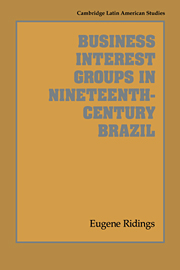Book contents
- Frontmatter
- Contents
- Acknowledgments
- Abbreviations and Usage
- Value of the Mil-reis against the Dollar and the Pound
- Brazil, with cities
- Introduction
- 1 The Genesis of Brazilian Business Interest Groups
- 2 Leadership and Organization
- 3 Influence, Ideology, and Public Relations
- 4 The Export Economy: Agricultural Quality, Markets, and Profits
- 5 The Export Economy: Banking, Credit, and Currency
- 6 The Export Economy: Manpower
- 7 Taxation
- 8 Industrialization
- 9 Communications: Regionalism Perpetuated
- 10 Port Areas and Harbors: Efficiency and Rivalry
- 11 Business Interest Groups and Economic and Urban Integration
- 12 Business interest groups and the Republic
- 13 Conclusion
- Bibliography
- Index
1 - The Genesis of Brazilian Business Interest Groups
Published online by Cambridge University Press: 27 October 2009
- Frontmatter
- Contents
- Acknowledgments
- Abbreviations and Usage
- Value of the Mil-reis against the Dollar and the Pound
- Brazil, with cities
- Introduction
- 1 The Genesis of Brazilian Business Interest Groups
- 2 Leadership and Organization
- 3 Influence, Ideology, and Public Relations
- 4 The Export Economy: Agricultural Quality, Markets, and Profits
- 5 The Export Economy: Banking, Credit, and Currency
- 6 The Export Economy: Manpower
- 7 Taxation
- 8 Industrialization
- 9 Communications: Regionalism Perpetuated
- 10 Port Areas and Harbors: Efficiency and Rivalry
- 11 Business Interest Groups and Economic and Urban Integration
- 12 Business interest groups and the Republic
- 13 Conclusion
- Bibliography
- Index
Summary
The rise of business interest organizations in the nineteenth century reflected first the increasing prosperity and complexity of Brazil's international trade and later the significant growth of manufacturing. These organizations included commercial associations, industrial groups, and factor groups. Factors acted as intermediaries between the overseas merchant and the export producer, not only marketing the latter's commodities but usually furnishing him with credit and consumer goods as well. Commercial associations and factor groups were created to confront the problems and grasp the opportunities of an expanding economy based on foreign commerce. More specifically, commercial associations aimed at promoting the economic development of the region tributary to the entrepôt they represented and defending the general interests of overseas trade. Factor groups worked to bolster the prosperity of sugar and coffee exportation. Industrial groups promoted the spread of manufacturing. Realization of all such objectives required a favorable attitude from the state or its outright aid. Government intervention in the economy was a Brazilian tradition that even the fashion for economic liberalism in the nineteenth century would do little to weaken. Business interest groups would mainly affect Brazilian development by influencing the government's role in the economy.
Advancing the interests of overseas trade, local prosperity, industry, or a specific commodity required collective representation. Large corporations were few in nineteenth-century Brazil, and individual business firms, as elsewhere, of limited size and economic impact. They usually consisted of several partners operating on such capital as they could raise themselves. Individually such partnerships, even those representing large overseas trading companies, could exercise little influence on government.
- Type
- Chapter
- Information
- Publisher: Cambridge University PressPrint publication year: 1994



